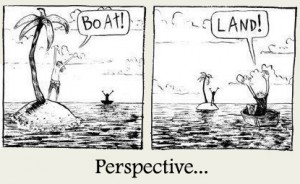Our perspectives are the objective, rational observations of objects or events. Our perspectives are the literal point of view from where we are standing. Our perceptions are the subjective interpretation of those observations. Our perspectives inform our perceptions and it is our perceptions that focus on emotionally connecting the dots of what we saw and subjectively formulating what it means to us. If our perspective is not providing us with correct or helpful information, then naturally our perception will be biased and impaired.
It all starts with perspective.
It all starts with perspective. Perspectives inform our perceptions, link and our perceptions form the reality that we know and respond to.
I wanted to begin by getting that right out there and making it as simple and clear as possible, because what you see influences what you think you have seen, and what you think you have seen creates the reality from which you react to and respond from. I also wanted to begin by getting that right out there because for regular readers of my blog and now subscribers to this bi-monthly newsletter written for and shared on behalf of Safe Harbor Christian Counseling you will see me refer to PERSPECTIVES and PERCEPTIONS frequently and I felt it best to start off by sharing a quick summary of the distinction between the two terms.
I am sharing this specifically with you because many of you (and not just dozens, or hundreds, but literally over 1,000 of you) helped me to discover the importance of perception while conducting my doctoral research over 3 years ago. What began as a study of the roll one’s relationship with God played in predicting one’s marital satisfaction ended up uncovering some truths that had never been written about before. Sure, there were several hypothesis that were proposed and confirmed, and I look forward to sharing with you those results in upcoming posts, but I thought it would be more fitting (and more fun) to share with you something that we did not expect to find: your perceptions are greater than reality.
As it turns out, statistically speaking and within the context of my doctoral dissertation study, perception is four times greater than reality. I am also eager to share the nuances and mathematical support for that statement, but let me begin where many of us like to end and share and offer how this impacts you and I on a daily basis.
What we think we see is more important than what we see.
What we think we see is more important than what we see. There is a cartoon I have seen online where a man is drawn stranded on an island in the first frame. He sees a man on a boat in the distance, throws his arms up, and exclaims, “Boat!” believing that his rescuer has finally arrived. In the second frame, we see a man standing on a boat with his arms also up over his head, looking toward the first man as he celebrates and yells, “Land!” A single-word caption below the cartoon reads, “Perspective…” It all starts with perspective.
What we see from where we are standing has the power to give us hope or to crush our spirits. Being stranded on an island or surviving on a lifeboat after being adrift at sea provides you with a singular perspective. The bad news for our two stranded cartoon characters is that neither one is rescued, even if no longer alone. The good news is that they are fictional characters, and it does not matter what happens to them. You, on the other hand, are indeed real, and it matters a great deal what happens to you. You are worth rescuing.
It all starts with perspective, but it is our perception (what we think we see) that informs how we are going to respond. If you see value in your marriage and believe it is worth fighting for, you will be more inclined to do whatever it takes to strengthen your marriage. If you think your boss does not like you, then you will likely read into things and become even more convinced that your boss does not like you. If you believe that you have what it takes to score the winning point or goal when it really matters, guess who will be empowered to be there when the game is on the line? To a very large degree, what you think you see is more important that real reality, because it is the reality from which we respond out of.
For my thoughts are not your thoughts, neither are your ways my ways.
Lining up our perceived reality with real reality will transform your life and every relationship you have. In our upcoming posts we’ll discuss some strategies on how to challenge our perceptions and find the truth, but for now let us be open to God showing us that all that we thought we have known may not be all that there is to be known. Isaiah 55:8 offers us some humbling words, “For my thoughts are not your thoughts, neither are your ways my ways,” declares the LORD. Perhaps what we have needed to bring about a positive change in a friendship, our marriage, or at work has been right before us all along, we just didn’t recognize it or see it. Thankfully, God knows all and sees all, and with some time, effort and a little bit of help we can learn to see things a little clearer and a little more like things really are.
I invite you today to ask God to begin to show you whatever it is He may want to show you, and to be open to seeing something again for the very first time.
[feather_share]



